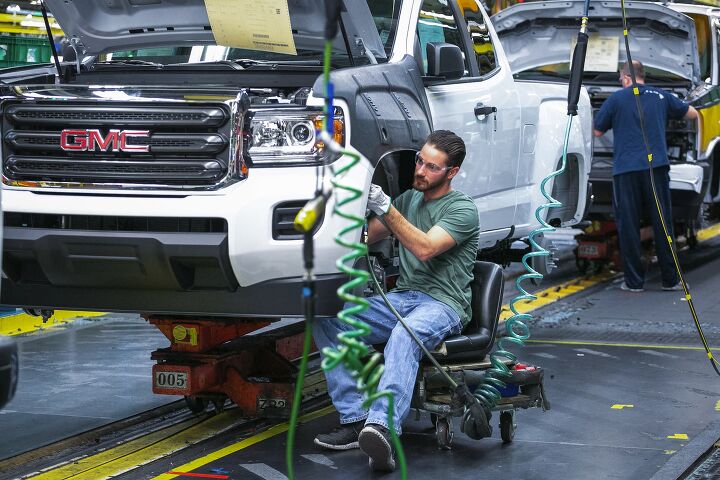Report: Suppliers Asking Automakers for Pricing Concessions Over UAW Strike

Ramifications from the UAW's strike against Detroit automakers was always going to reverberate throughout the industry and suppliers are asking for some concessions. But the reason isn’t wholly down to some of the obstacles created by the recent work stoppages and the long term implications are beginning to mount.
According to a report from Automotive News, suppliers have been under intense financial pressure from the automakers prioritizing just-in-time manufacturing, rolling component shortages, a lopsided labor market, and increasingly high material costs. While plenty of that was accelerated by the global response to the pandemic, a lot of issues actually predate COVID by years.
In response, suppliers have been going to their automaker customers seeking concessions on pricing to help cope with some of the problems they’ve been facing. But industry analysts are claiming they’ve enjoyed limited success and frequently return empty handed — even when it’s the big boys making the request — and that trickles down to make trouble for the smaller fish.
From Automotive News:
In turn, Tier 1 suppliers often have been unable to provide appropriate levels of relief to their Tier 2 suppliers, whose finances have been hit even harder in recent years, creating a situation where the entire supply chain is on edge because of the strike despite sky-high automaker profits, experts said.
"From the customer's position, they might say it's because a supplier isn't managing their business properly or controlling their costs, but that only goes so far," said Dan Rustmann, co-chair of Detroit law firm Butzel Long's global automotive group. "Across the supply base, suppliers have been suffering from increased costs and fixed-price contracts and really having to fight and argue to get any relief.
"And if it comes, it comes very grudgingly."
To be sure, many suppliers have received much-needed relief from automakers or their Tier 1 customers. And despite the significant pressure suppliers have found themselves under after unprecedented challenges in recent years, a wave of supplier bankruptcies that some have feared has not come to pass.
To be sure, many suppliers have received much-needed relief from automakers or their Tier 1 customers. And despite the significant pressure suppliers have found themselves under after unprecedented challenges in recent years, a wave of supplier bankruptcies that some have feared has not come to pass.
While the biggest companies seem to love consolidation, it’s not really benefiting anyone when the foundation of an industry’s ecosystem is crumbling. Bigger companies may be able to swoop in and absorb those businesses. But it’ll be years before they’re likely to have the same expertise and they’re often left bloated.
Some of this is the result of the industry trying to pivot toward all-electric vehicles, resulting in a scenario where automakers need fewer traditional suppliers and have to build relationships with EV-focused businesses located in other parts of the world. Having spoken to plenty of suppliers over the years, many have told me they tried to adapt to EV production only to be confronted with inconsistent orders. There remains a lot of uncertainty in terms of electrification and many suppliers were already feeling raw about wonky production runs before EVs were on the table.
The rest seems to be down to what happened after 2019. Whereas major automakers were immediately supported by the government during lockdowns, smaller suppliers dotted across the planet were not afforded this luxury.
"The cherry on top of the cake for suppliers has been inflation and not getting pricing from their customers to stay whole from a profitability perspective," said Michael Robinet, executive director of Automotive Advisory Services at S&P Global Mobility. "Suppliers have not been able to stretch their legs and make money to make up for all of their issues over the last four years."
Automotive News said that the largest suppliers are now obsessively monitoring the wellbeing of their supportive factories (occasionally offering assistance) as the UAW strike continues. With the union planning to expand its strike beyond the plants initially targeted, there’s a real chance things could get truly bleak for some of the smaller factories supplying parts for the vehicles that won’t be produced.
In the interim, they may not have the kind of reserve capital to wait out the storm. This also means there will be a lull before production ramps back up and staff is rehired.
"This is not a type of industry where you can go from zero to 100 overnight," explained Laura You, a member of Michigan law firm Warner Norcross and Judd's automotive and supply chain industry groups. "If your customer orders have been stopped altogether for a period of several weeks, it will take time to ramp back up."
Industry analysts are recommending (at least in this case) for suppliers to get into contact with automakers now to help minimize future headaches. The last thing anybody wants is for a prolonged strike to wrap up only for workers to return to assembly lines boasting an empty parts bin.
[Image: General Motors]
Become a TTAC insider. Get the latest news, features, TTAC takes, and everything else that gets to the truth about cars first by subscribing to our newsletter.

A staunch consumer advocate tracking industry trends and regulation. Before joining TTAC, Matt spent a decade working for marketing and research firms based in NYC. Clients included several of the world’s largest automakers, global tire brands, and aftermarket part suppliers. Dissatisfied with the corporate world and resentful of having to wear suits everyday, he pivoted to writing about cars. Since then, that man has become an ardent supporter of the right-to-repair movement, been interviewed on the auto industry by national radio broadcasts, driven more rental cars than anyone ever should, participated in amateur rallying events, and received the requisite minimum training as sanctioned by the SCCA. Handy with a wrench, Matt grew up surrounded by Detroit auto workers and managed to get a pizza delivery job before he was legally eligible. He later found himself driving box trucks through Manhattan, guaranteeing future sympathy for actual truckers. He continues to conduct research pertaining to the automotive sector as an independent contractor and has since moved back to his native Michigan, closer to where the cars are born. A contrarian, Matt claims to prefer understeer — stating that front and all-wheel drive vehicles cater best to his driving style.
More by Matt Posky
Latest Car Reviews
Read moreLatest Product Reviews
Read moreRecent Comments
- Arthur Dailey Agree with @Jeff, if you needed a cheap vehicle that was relatively robust and last a long time and you did not care about driving dynamics you could do worse than a J-Car. They as the saying go, drove badly, for a long time. They were less rust prone than many Japanese imports, and either more reliable or more robust than many (most) European or Korean autos. And parts were cheap and repairs relatively simple. As he writes, we complain about the lack of inexpensive, basic autos but then criticize autos that were inexpensive and basic. As the saying goes 'you can get cheap, fast or good, but you cannot get all 3 in the same product'.
- Bd2 Overpriced food, awful home furnishings, endless assortments of sugary candy and drinks which are mostly garbage and childish gimmicks galore. Indeed, the most "American" of traditions.
- SCE to AUX Some pretty big strikes:[list][*]Drivetrain - how can a straight-6 be thrashy? Shame on you, Mazda.[/*][*]Poor fuel economy.[/*][*]Tire noise.[/*][*]Poor user interface.[/*][*]That colored dash is a bit garish for me.[/*][*]High price.[/*][*]Indistinct look in the Mazda lineup. Their SUVs are Russian nesting dolls.[/*][*]Nothing compelling to lure a buyer away from the bigger brands.[/*][/list]I don't see this moving the needle for Mazda in the US market.
- Ash78 Dear unions, thank you for your service and for expressing interest in our automotive factories. Due to your many decades of pressuring employers to do better, the more adept companies have gotten your message and have implemented most of your demands preemptively in order to maintain a better employer-employee relationship than the manufacturing industry as a whole.We truly appreciate your feedback and interest, and all it has done to improve employer relations since the industrial revolution. We take your concerns seriously and will be glad to reach back out if our situation changes.We will keep your resume on file for three years, per company policy.Sincerely,Everyone
- Theflyersfan I'm having a tough time figuring out Mazda's recent lineup decisions. I've mentioned before how having the CX-5 and CX-50 makes no sense as it seems like they would steal each other's sales instead of conquest sales from other brands. And now here comes the CX-70 vs 90 decision. If Mazda wanted to position the 70 above the 90 with pricing, I think they should have gone the Audi Q7 vs Q8 route. The Q8 costs more, has one fewer row, and is smaller on the inside, but has the more aggressive styling and tries to position itself as the sportier alternative large CUV in their lineup. With Mazda, the 70 and 90 seem to be in the position, like the 5 vs 50, to steal each other's sales. There isn't anything compelling me to get a 70 if I get more for my money with a 90, except 100,000 miles down the road, I won't have a folded up third row seat rattling around loosely. Mazda should have brought over the CX-60 and position that where they wanted the 70. I understand it's a touch larger than the X3, Q5, and GLC CUVs, which is a sweet spot in that market. Make the CX-70 a sportier alternative 2-row instead of such a blatant cynical move of just ripping a seat out of the 90, calling it an all new model and price it in the same ballpark. I want Mazda to succeed and continue to be independent, but decisions like these make me wonder what their future plans are.


































Comments
Join the conversation
The two Louisville truck plants are still operating, but not sure for how much longer. I have a couple of friends who work at a manufacturing company in town that makes cooling systems for the trucks built here. And they are on pins and needles wondering if or when they get the call to not go back to work because there are no trucks being made. That's what drives me up the wall with these strikes. The auto workers still get a minimum amount of pay even while striking, but the massive support staff that builds components, staffs temp workers, runs the logistics, etc, ends up with nothing except the bare hope that the state's crippled unemployment system can help them keep afloat.
In a city where shipping (UPS central hub and they almost went on strike on August 1) and heavy manufacturing (GE Appliance Park and the Ford plants) keeps tens of thousands of people employed, plus the support companies, any prolonged shutdown is a total disaster for the city as well. UAW members - you're not getting a 38% raise right away. That just doesn't happen. Start a little lower and end this. And then you can fight the good fight against the corner office staff who make millions for being in meetings all day.
Union workers are only concerned about themselves. They don't care who else gets hurt when they throw a tantrum, er, strike.